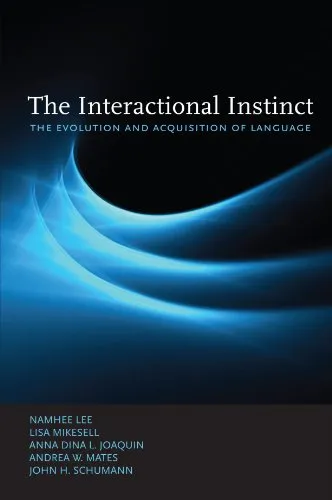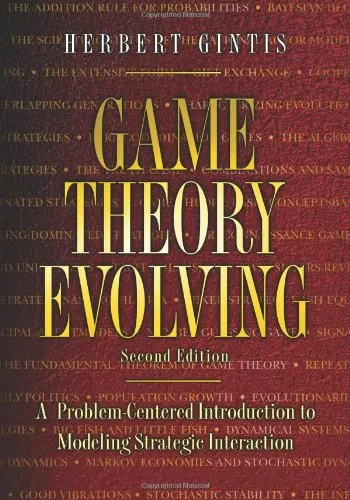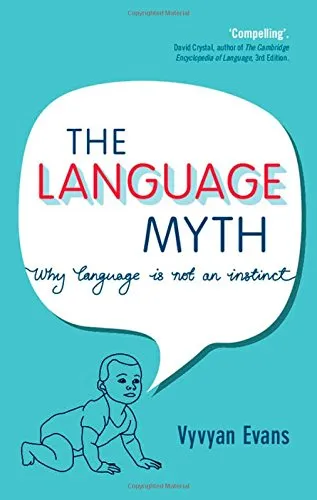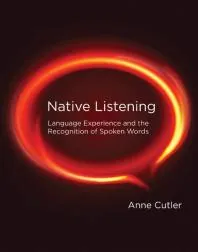The Interactional Instinct: The Evolution and Acquisition of Language
4.5
بر اساس نظر کاربران

شما میتونید سوالاتتون در باره کتاب رو از هوش مصنوعیش بعد از ورود بپرسید
هر دانلود یا پرسش از هوش مصنوعی 2 امتیاز لازم دارد، برای بدست آوردن امتیاز رایگان، به صفحه ی راهنمای امتیازات سر بزنید و یک سری کار ارزشمند انجام بدینکتاب های مرتبط:
معرفی کامل کتاب "The Interactional Instinct: The Evolution and Acquisition of Language"
کتاب The Interactional Instinct: The Evolution and Acquisition of Language نوشته نم هی لی، لیسا مایکسل، آنا دینا ال. خواکین، آندریا دابلیو. میتس و جان اچ. شومن، نگاهی نو به ریشههای تکاملی زبان و فرآیند پیچیده یادگیری آن ارائه میدهد. این کتاب با بهرهگیری از حوزههای مختلف مانند زیستشناسی فرگشتی، روانشناسی، و زبانشناسی اجتماعی به بررسی این میپردازد که چرا زبان به یک ابزار ارتباطی مهم در زندگی انسان تبدیل شده است.
در ادامه، جزئیات بیشتری درباره این اثر ارزشمند بررسی کرده و به اهمیت آن در مطالعات زبانشناسی و روانشناسی پرداخته میشود.
خلاصهای جامع از کتاب
در این کتاب، نویسندگان فرضیه اصلی خود را با عنوان Interactional Instinct ارائه میدهند. این فرضیه توضیح میدهد که چهطور انسانها یک گرایش غریزی برای ایجاد روابط اجتماعی و تعاملات زبانی دارند که نهایتاً به فرایند یادگیری زبان منجر میشود. برخلاف دیدگاههای قدیمیتر که بیشتر بر جنبههای شناختی تاکید داشتند، نویسندگان این کتاب استدلال میکنند که تعامل اجتماعی و نیازهای ارتباطی انسانها به همان اندازه مهم و تاثیرگذار است.
این کتاب همچنین به بررسی تاریخی فرگشت زبان پرداخته و بر این نکته تاکید دارد که یادگیری زبان نه تنها ناشی از قدرت مغز انسان بلکه نتیجه نیازهای اجتماعی و تعاملات انسانی است. نویسندگان با استفاده از شواهد علمی از مطالعات زیستشناسی، روانشناسی تکاملی و زبانشناسی، پایههای نظری فرضیه خود را محکم میکنند و به خواننده یک دیدگاه جامع و جذاب ارائه میدهند.
موضوعات کلیدی کتاب
- نقش تعاملات اجتماعی در یادگیری زبان.
- بررسی جنبههای زیستشناختی فرگشت زبان.
- رابطه بین زبان و نیاز به برقراری ارتباط در انسانها.
- نقد نظریههای سنتی مربوط به زبانآموزی و تاکید بر اهمیت instinct در زبانشناسی.
نکات برجسته از کتاب
- غریزه تعاملی: زبانآموزی نه فقط یک فرآیند شناختی بلکه یک فرآیند اجتماعی است.
- جهانی بودن تعاملات اجتماعی: تمام فرهنگها و جوامع انسانی بر پایه نیاز به تعامل زبانی شکل گرفتهاند.
- تکامل زبان: زبان به عنوان ابزاری برای تعاملات اجتماعی تکامل یافته است، نه صرفاً برای انتقال اطلاعات.
نقلقولهای معروف از کتاب
“Language acquisition is not merely a cognitive function but a profoundly social and interactional process.”
“The evolution of language is deeply tied to the human need for forming connections and meaningful interactions.”
چرا مطالعه این کتاب مهم است؟
کتاب The Interactional Instinct دیدگاهی نو و قابل تامل در مورد یادگیری زبان ارائه میدهد که میتواند برای دانشجویان، پژوهشگران، و علاقهمندان به زبانشناسی، روانشناسی و حتی آموزش زبان بسیار ارزشمند باشد. این کتاب با ادغام رشتههای مختلف، اطلاعات گسترده و جامعی فراهم میآورد که میتواند تحقیقات آینده را شکل دهد و راهحلهای نوینی برای مشکلات آموزش زبان در اختیار قرار دهد.
در نتیجه، این اثر علاوه بر این که به بررسی علمی روانشناسانه و زبانی میپردازد، بر اهمیت نقش تعاملات انسانی در شکلگیری زبانهای بشری تاکید میکند و ارتباط میان زیستشناسی و جامعهشناسی را برجسته میسازد.
Introduction to "The Interactional Instinct: The Evolution and Acquisition of Language"
"The Interactional Instinct: The Evolution and Acquisition of Language," authored by Namhee Lee, Lisa Mikesell, Anna Dina L. Joaquin, Andrea W. Mates, and John H. Schumann, delves into one of the most intriguing aspects of humanity: language. This book investigates the origins, development, and fundamental role of social interaction in language evolution and learning. It provides a groundbreaking theoretical framework that views language acquisition as rooted innately in human interactional instincts. Written with an interdisciplinary approach, this book bridges the realms of linguistics, psychology, anthropology, and neuroscience to explore how linguistic skills emerge and why they are such an essential aspect of human life.
Detailed Summary of the Book
At its core, "The Interactional Instinct" challenges the common perception that the acquisition of language is solely based on innate cognitive modules or isolated learning processes. Instead, it builds upon the argument that humans are naturally equipped with an instinct to interact socially, and this instinct is what fosters our unique ability to acquire language. The book extensively examines the interplay between cultural, biological, and social factors that have shaped language over evolutionary history.
The authors introduce the concept of the "interactional instinct," which describes the innate motivation humans have to engage in interactions with others. Through these social dynamics, individuals learn the nuances of language, from its basic structure to its complex systems of meaning. The work also draws comparisons between humans and other species, highlighting the unique role that interaction plays in human development as opposed to other communicative systems in nature.
Through empirical studies, real-world examples, and theoretical analyses, this book provides insight into the dynamic relationship between early caregiving, social affiliation, and the acquisition of linguistic abilities. The authors specifically focus on how infants and young children acquire language skills in the context of everyday human bonds and communicative exchanges. Additionally, the book postulates that this intrinsic interactional drive was a necessary precursor for the evolution of complex language systems.
Key Takeaways
- Humans possess an evolutionary instinct for interaction, which plays a pivotal role in the development of language.
- Language cannot be solely explained by cognitive processes; it is inherently tied to human social dynamics and relationships.
- The developmental process of language acquisition is deeply intertwined with parent-child interactions and early social experiences.
- The evolution of human language is distinct from other animal communication systems, primarily due to our reliance on interpersonal bonds and shared meaning.
- Understanding the interactional instinct provides insights into how language deficits may emerge in individuals with atypical developmental trajectories.
Famous Quotes from the Book
"Language does not simply emerge from cognition; it arises from the bond between humans and their desire to connect, share, and belong."
"The interactional instinct is more than a theory; it is the key to understanding why humans are the only species capable of such elaborate linguistic systems."
"Every conversation, every word spoken, is a reflection of the fundamental human need to interact and create shared meaning."
Why This Book Matters
"The Interactional Instinct" is not just a deep exploration of language acquisition—it is also a profound commentary on what makes humans unique. This book matters because it shifts the paradigm in linguistic and social sciences by providing a new way to understand how language comes into being. It underscores the importance of social bonds and interaction in human development, emphasizing the role of relationships over isolated cognitive mechanisms.
Moreover, the book offers valuable implications for education, language therapy, and understanding individuals with language development disorders. By shedding light on the interactional foundation of language, it opens up possibilities for addressing communication challenges in diverse populations. Scholars, educators, and linguists alike will find this work invaluable for its innovative perspectives and interdisciplinary approach.
In an era where communication is central to personal and societal growth, understanding the instinctual roots of language offers a profound insight into humanity's evolutionary journey. "The Interactional Instinct" is a timely reminder of why language continues to form the bedrock of our collective human experience.
دانلود رایگان مستقیم
شما میتونید سوالاتتون در باره کتاب رو از هوش مصنوعیش بعد از ورود بپرسید
دسترسی به کتابها از طریق پلتفرمهای قانونی و کتابخانههای عمومی نه تنها از حقوق نویسندگان و ناشران حمایت میکند، بلکه به پایداری فرهنگ کتابخوانی نیز کمک میرساند. پیش از دانلود، لحظهای به بررسی این گزینهها فکر کنید.
این کتاب رو در پلتفرم های دیگه ببینید
WorldCat به شما کمک میکنه تا کتاب ها رو در کتابخانه های سراسر دنیا پیدا کنید
امتیازها، نظرات تخصصی و صحبت ها درباره کتاب را در Goodreads ببینید
کتابهای کمیاب یا دست دوم را در AbeBooks پیدا کنید و بخرید
1302
بازدید4.5
امتیاز0
نظر98%
رضایتنظرات:
4.5
بر اساس 0 نظر کاربران
Questions & Answers
Ask questions about this book or help others by answering
No questions yet. Be the first to ask!














